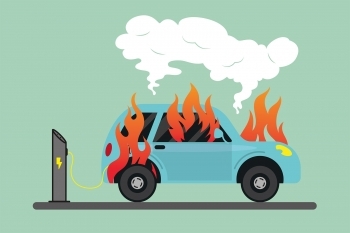
.png) Aarti
Aarti

Considered the fifth largest in the world, the Indian automotive industry is expected to be the third largest by 2030. Thanks to the push and support being provided by the Union Government, the electric vehicle industry in particular seems to be picking pace. India reported sales of over 300,000 EV units in 2021. A production-linked incentive scheme for the automotive sector is in vogue to boost the manufacturing of electric vehicles and hydrogen fuel cell vehicles.
Now, with more than half-a-dozen incidents of fire on EVs, mainly two-wheelers, within a month in different parts of the country, there have been several debates concerning their safety. 40 electric scooters of Jitendra Electric Vehicles caught fire in a transport container in Nashik on April 9. On March 26, a S1 Pro model of Ola Electric scooter caught fire in Pune while a Praise Pro model of Okinawa was burnt in Tamil Nadu's Vellore. Similarly, fire incidents involving EVs were reported from Trichy and Chennai, both in Tamil Nadu.
Reportedly, Okinawa Autotech has recalled 3,215 units of its 'Praise Pro' scooters to fix "any issue" related to batteries. Ola Electric, too has voluntarily recalled 1,441 e-scooters as a pre-emptive measure to conduct a detailed health check of the concerned batch that caught fire in Pune.
Apart from preparation of comprehensive guidelines for the EV industry, the Government of India is said to have asked EV original equipment manufacturers to voluntarily recall batches involved in the EV fire incidents in order to instill confidence in consumers.
EVs are powered by lithium-ion (Li-Ion) battery, which are generally considered to be lightweight and efficient. However, they also pose a fire risk because the movement of electrons and lithium ions produces electricity. The process of charge and discharge is normally accompanied by a small amount of heat. Although in ideal conditions, the heat is able to dissipate from the cell, in thermal runaway, the Li-Ion cell generates heat at a rate several times higher than the rate at which heat dissipates from the cell. When its temperature rises at a rate greater than 20 degrees centigrade per minute, it means that the cell has reached thermal runaway. So, when the heat generated within a battery exceeds the amount of heat and this excessive heat is not remedied, the internal battery temperature may rise causing battery current to rise, thus creating a domino effect. The rise in temperature in a single battery will begin to affect other batteries in close proximity.
According to experts, even as EV fires aren’t necessarily more common than standard car fires, they are extremely volatile and challenging to put out. Some time back, when an electric SUV crashed into a garage in a suburban neighborhood in the US, it sparked a blaze which then ignited the house. While the fire fighters thought they had it under control after some 45 minutes, new smoke started to emerge from the vehicle. Some 20,000 gallons of water was used as the underside of the vehicle kept reigniting. As the SUV was being loaded into a truck, it reignited once again forcing firefighters to spray another 300 gallons of water per minute to cool the SUV's battery.
Studies have shown that EV fires can be caused by physical damage to the Li-Ion battery cells or they might also be caused by pollution in the electrolyte or the poor quality of the separator. A Li-Ion fire is difficult to fight due to the chemical reaction that continuously creates oxygen. So, as a precaution, many battery manufacturers abroad perform an X-ray of all batteries, to ensure the electrolytes are not polluted.
Most EV manufacturers try to address the fire issue at the BMS (Battery Management System) level. Simply put, it is an electronic system that manages a rechargeable battery. BMS monitors voltages, temperature, capacity, state of charge, power consumption, remaining operating time, charging cycles etc. Thus, BMS ensures the optimal use of the residual energy present in a battery and avoid overloading. In case of any issue that can induce fire, these BMS completely cuts-off the battery power from the high-voltage components.
While the forensic audit into EV fires ordered by the Government is expected to provide valuable inputs to prevent such mishaps, there is an imperative need to regulate the manufacturing of EV batteries.
Among others, the advantages of using an EV is that it is environment friendly. It minimises air pollution, having less or no sound, EVs help greatly in reducing noise pollution. Cost-wise, it is estimated that fuel expenses are reduced to the tune of 75-80 per cent in EVs and has a lesser maintenance cost due to fewer moveable parts.
The EV industry in India is estimated to touch 63 lakh units per year by 2027. It is an onerous task to ensure that are affordable and safe to use. Above all, it needs to be appreciated that human safety is simply non-negotiable.